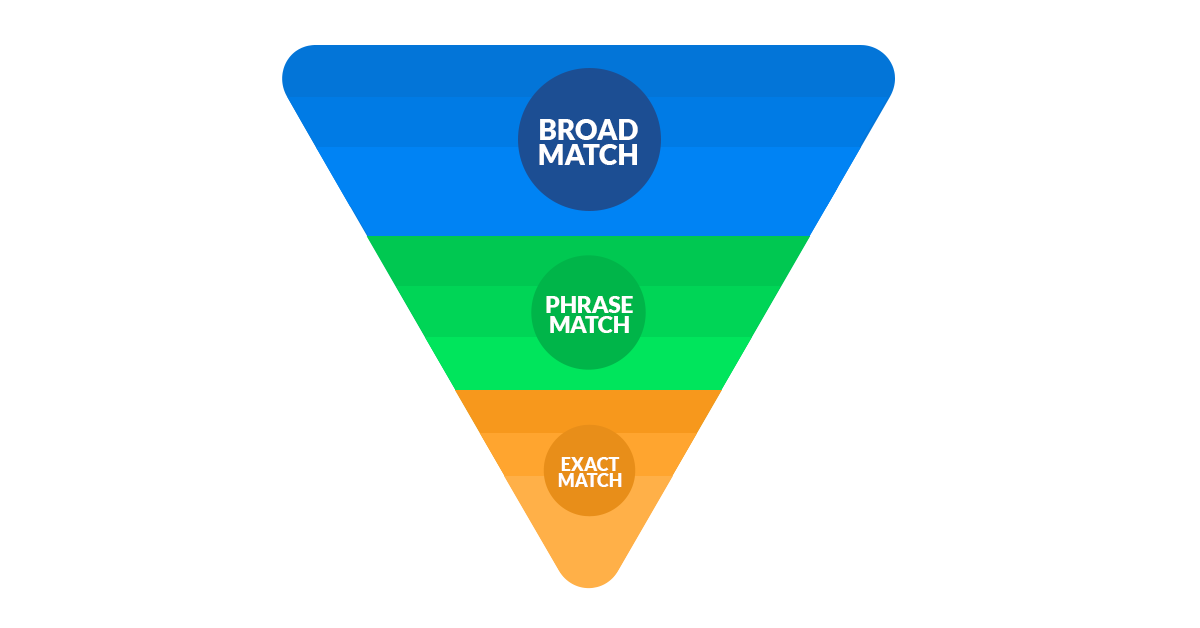When you start a PPC search campaign in Google Ads, you need to choose keywords that active users are searching for or have high interest. But is there a difference between keywords? What types of keywords should I be using? Well first, you will need to choose a keyword match type that tells Google how restrictive your advertisement should be shown. In Google Ads, there are three basic keyword match types:
Broad match
Phrase match
Exact match
In this blog, we will walk through the three different match types, how they are different, and why they are important to your campaign success.
Broad Match
In order for a search campaign to be successful, you will need to choose a keyword match type. Broad match is the default keyword match. When you enable broad keyword match, any word in that key phrase and any related keywords will trigger your ad to be shown. For example, if you use broad match on “luxury car,” your ad would be displayed if a user types “luxury cars,” “fast cars,” or “luxury apartments,” as well as “expensive vehicles”. Since broad match is the default type, it is very important to keep an eye on the relevant search terms your ads are showing up for to determine if you are paying for relevant traffic.
Phrase Match
Phrase match will trigger an ad to appear when a user types in the exact order of keywords or phrases. Back in 2019, Google expanded the phrase match to include synonyms, plurals, and other variants of a keyword. For example, if you are targeting “lawn mowing service” as your key phrase, in addition to showing for “lawn mowing service prices”, it could now also show for “grass cutting services near me”. By the addition of this feature, it will expand your potential search pool and help generate high converting traffic to your website.
Exact Match
Exact match is the most restrictive and specific keyword type. Originally exact keyword phrase would trigger an ad to be shown ONLY if a user typed in the exact keyword(s). For example, if your keyword phrase was “black cocktail dress,” your ad would only be eligible to show up when a user searched for “black cocktail dress” (those words in that exact order) and not for “cocktail dress,” “black dress” or “expensive black cocktail dress.” However, Google has since expanded its exact keyword match type to also include synonyms, plurals, and slight variations on your original exact keyword. For example, if your keyword is “yosemite camping”, with the updated exact keyword type, your ad will be triggered by “yosemite national park ca camping”, “yosemite campground”, or even “campsites in yosemite”. One of the bonuses to exact keywords are that users who engage with your ads show a higher intent to convert, so these keywords will help reduce cost and elevate your conversion rate.
Do Match Types Affect Search Results?
The short answer is yes, they can absolutely affect how your PPC campaigns perform. They control who sees your ads and at what rate it costs to have your ad be delivered to your audience. Here are some other reasons how they affect your campaigns:
Insights into which keywords provide the best return on investment
How your competition bids on terms and see how your account stacks up
Determines which keywords to bid on which will control your cost per click and cost per conversion
Choosing the right match types is crucial because it allows you to reach your target audience while avoiding unnecessary spend on irrelevant clicks.
